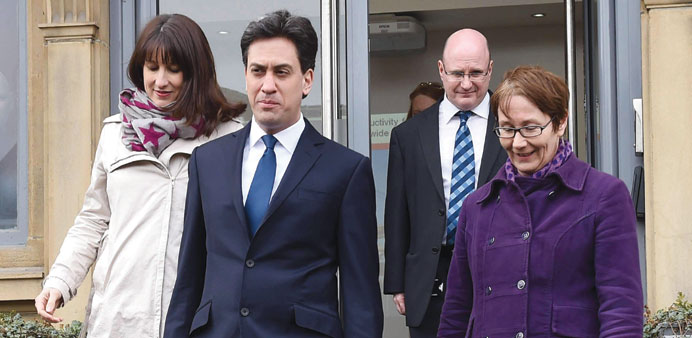AFP/London
Opposition leader Ed Miliband yesterday promised greater job security and a clampdown on “zero-hours contracts” - a hot-button election issue despite the country’s strong economic recovery.
The centre-left Labour Party leader was speaking at an engineering equipment factory in Huddersfield on a campaign stop ahead of a knife-edge general election on May 7 that could make him the prime minister.
“There’s no greater symbol for an economy that doesn’t work for many people than zero-hours contracts,” Miliband told the factory workers.
Under these contracts, introduced under a Conservative government in the 1990s to make it easier for students and seasonal workers to get jobs, employers have full discretion to vary working hours.
Miliband promised that Labour would pass a law in its first year of government granting employees regular contracts after 12 weeks of working regular hours on a zero-hours contract.
Prime Minister David Cameron’s Conservative Party said that only one in 50 jobs in Britain is under this type of contract and that the government has already tackled abuses.
Cameron has made economic achievements a cornerstone of his campaign, touting healthy growth and tumbling unemployment, but Labour says the recovery has benefited the rich while many Britons are stuck in a “cost of living crisis”.
The use of zero-hours contracts has mushroomed under Cameron’s Conservative-Liberal Democrat coalition.
Official statistics show that almost 700,000 people in Britain have a zero-hours contract as their main source of revenue - four times more than in 2010 when Cameron came to power.
Miliband said there had been a 20% increase in zero-hours contracts in the past year alone.
The Labour proposal immediately raised hackles at the Confederation of British Industry business lobby.
“Of course action should be taken to tackle abuses but demonising flexible contracts is playing with the jobs that many firms and many workers value and need,” said CBI director general John Cridland.
British trade unions have waged a long campaign against zero-hours contracts, although the ultra-liberal policy has appeal for European Union countries looking to increasing labour market flexibility.
But Frances O’Grady, general secretary of the Trades Union Congress, said: “Zero-hours workers are often too afraid to speak up for their rights for fear of losing work. We need a fairer system that guarantees zero-hours workers decent rights at work and stops them from being treated like second-class employees,” she said.

Labour Party Ed Miliband walks with Labour Party candidate for the Leeds West constituency Rachel Reeves (left) during a general election campaign vis
